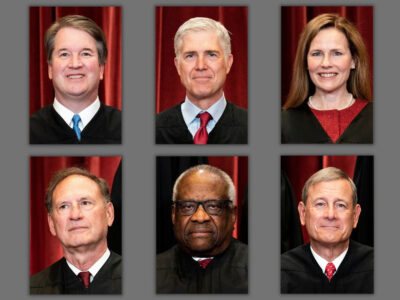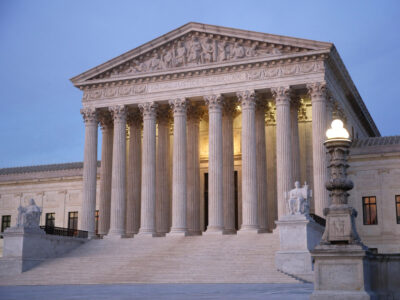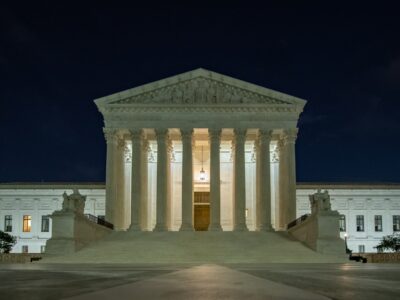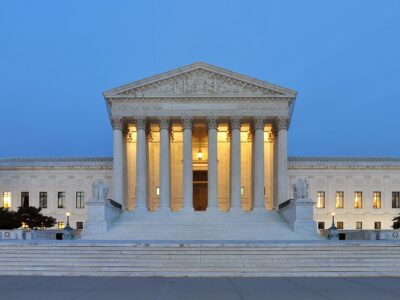Chevron deference
Understanding Loper: A Sheep in Wolves’ Clothing?
The real world effects may be limited. Or they may undercut presidential power, to the surprise of advocates of the unitary executive.
Because there are so many outstanding questions about the Court’s new approach to judicial review, we won’t know its practical impact for some time. Its symbolic impact as an affirmation of conservative ideology is more obvious.
CONTINUE READINGUnderstanding Loper: The Grandfather Clause
Hundreds of past federal cases relied on Chevron. They remain good law.
To cushion the shock of abandoning Chevron, the Supreme Court created a safe harbor for past judicial decisions. This was well-advised. The Court itself applied Chevron at least seventy times, as did thousands of lower court decisions. The key question will be the scope of the grandfather clause. The Court’s discussion began by saying that …
Continue reading “Understanding Loper: The Grandfather Clause”
CONTINUE READINGUnderstanding Loper: The Primacy of Skidmore
A previously obscure 1944 case will now be central to judicial review.
Some commentators have tended to write off Skidmore and assume that judges will ignore agency views after Loper Bright. That is a misreading of the Court’s opinions in Loper and in Skidmore itself.
CONTINUE READINGUnderstanding Loper: Delegation & Discretion
Something similar to Chevron deference may still apply to many (most?) regulations.
The Supreme Court took away Chevron deference, but it also recognized that Congress can give agencies the power to clarify statutes and fill in gaps.
CONTINUE READINGIs Loper v. Raimondo Really the Power Grab Commentators Assume?
The Supreme Court has already grabbed power from agencies through the major questions doctrine.
Headlines about today’s decision in Loper v Raimondo overturning the 40 year-old decision in Chevron v NRDC that granted agencies deference in their interpretation of ambiguous statutes focus on the “massive power grab,” the decision’s “sweeping” nature and call it a “blow” to the administrative state. My view may be idiosyncratic but I don’t view …
Continue reading “Is Loper v. Raimondo Really the Power Grab Commentators Assume?”
CONTINUE READINGUpcoming Regulatory Cases in the Supreme Court
Two pending cases could result in big cuts to agency powers
Three weeks from today, the Supreme Court starts its 2023 Term. There are two blockbuster cases on the docket. In one case, the issue is whether to overrule the Chevron case, which has been foundational to administrative law for the past four decades. In the other, the issue is agency power to sanction violations of …
Continue reading “Upcoming Regulatory Cases in the Supreme Court”
CONTINUE READINGEndangered Deference
The Supreme Court’s recent, misguided, Weyerhaeuser decision displays the Court majority’s hostility to agency expertise
Cross-posted from The Regulatory Review In Weyerhaeuser v. US Fish and Wildlife Service, a unanimous Supreme Court, with Justice Gorsuch not participating, indicated that it is not inclined to defer to agency expertise. Judicial power dominates this Court’s approach to administrative law, not just in the context of Chevron deference, and not just within the …
Continue reading “Endangered Deference”
CONTINUE READINGEverything You Always Wanted to Know About the Chevron Doctrine
This doctrine, formerly known only to specialists, will play a large role under Trump.
During the Gorsuch nomination, there was a lot of talk in the press about the Chevron doctrine. Most people have never heard of this doctrine, and only a few are aware of all the nuances. As the Trump Administration’s rulemaking efforts come before the courts, we’re going to be hearing a lot more about it. …
Continue reading “Everything You Always Wanted to Know About the Chevron Doctrine”
CONTINUE READINGSetback for EPA in Regulating Gases with High Global Warming Potential
DC Circuit vacates 2015 rule on HFCs
Today, the D.C. Circuit Court of Appeals vacated a 2015 EPA rule targeting the use of hydrofluorocarbons (HFCs), a class of potent greenhouse gases that are used as refrigerants and propellants for a variety of purposes as a substitute for ozone-depleting chlorofluorocarbons (CFCs) and hydrochlorofluorocarbons (HCFCs). The court’s decision is a setback for President Obama’s …
Continue reading “Setback for EPA in Regulating Gases with High Global Warming Potential”
CONTINUE READINGGuest Blogger Kate Konschnik: The Debate about EPA’s Authority to Regulate Carbon Pollution is a Lot of Things – But Not These Things
Kate Konschnik is the Director of Harvard Law School’s Environmental Policy Initiative. The views expressed in this blog post are her own.
Clean Power Plan challengers have asked the D.C. Circuit to stay the rule pending litigation. Today, industry and environmental groups supporting EPA will file their oppositions to this request. The stay motions included the charge that EPA may not use Section 111(d) at all to curb pollution from existing power plants. Dan Farber and I …
CONTINUE READING










